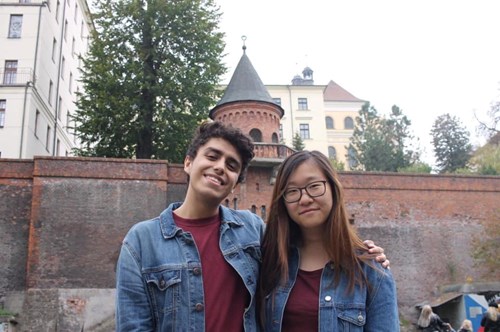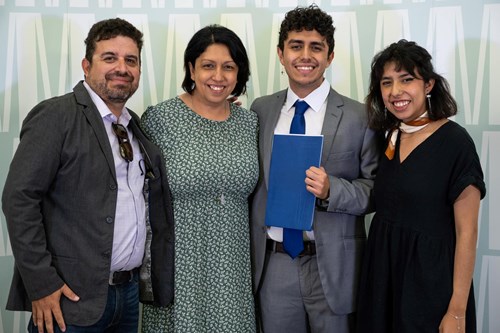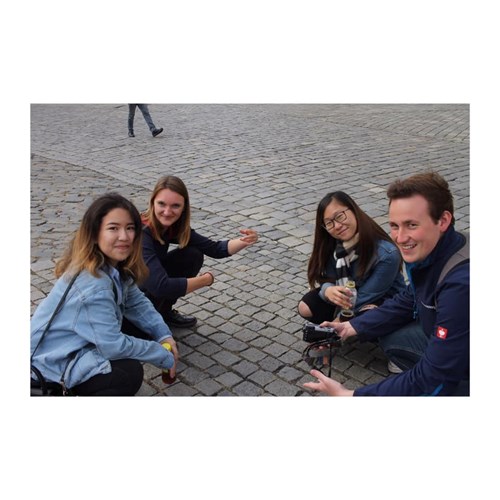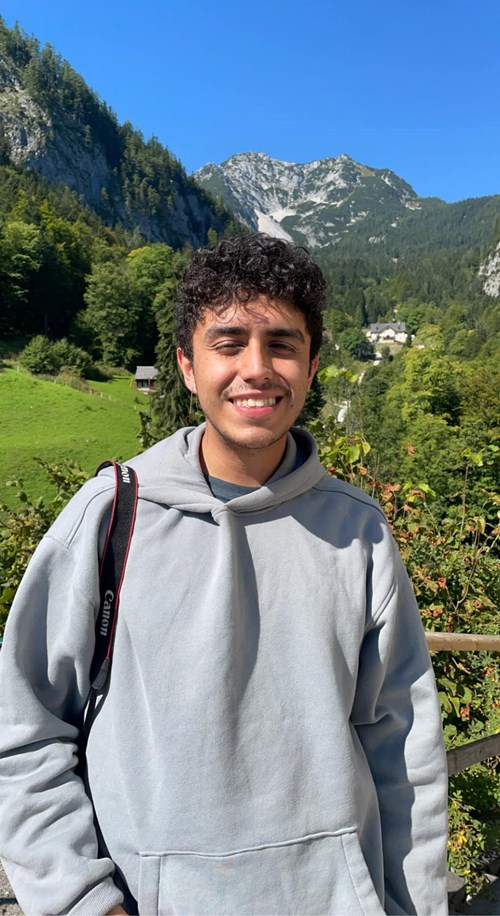
Nicholas De Leon
Bachelor’s in International Relations and European Politics, graduated in 2020
coming from the United States, currently working as a Product Marketing Specialist at BOKF Financial in Tulsa, Oklahoma
interviewed by Michaela Nespěchalová, April 2024
1. Can you share some highlights of your time at the Faculty of Social Studies?
I believe one of the biggest highlights of studying at FSS was being a part of a global community. I loved that each class was made up of so many different people from around the world. This was a very important thing I was looking for when I was applying to schools. For instance, back in 2016, before I had even heard of Brno or the Czech Republic, I had considered going to the University of Tulsa, located in my hometown of Tulsa, Oklahoma. They have a fantastic international relations/politics faculty, but because we are in Oklahoma, I knew that the International community wouldn’t host many international students. Eventually, once I had moved to Brno, that completely changed, and I absolutely loved it. Being amongst people from all different backgrounds helped me understand how different people think and how to work with them. It also taught me that I have so much more in common with people who are born all over the world than I would’ve imagined.
Another highlight for me was when we discovered that near the end of our bachelor’s studies, our final exam to graduate would go from a written to an oral exam. Due to the pandemic back in 2020, we could not physically be in the faculty so we had to switch to an online, zoom call to graduate college. When I read the email telling us we would be doing an oral exam, I’m sure I experienced my first panic attack! I had prepped for the exam for an entire month straight using small letter cards and began to quiz myself every few hours. When the time for the exam came, I was already back in Tulsa and I vividly remember having to wake up at around 4 or 5 am to log into zoom and take my test. I passed the test and I remember laughing at how anti-climatic the entire experience was; I can't remember who it was but someone said “congratulations, you’re all officially graduates of the international relations program!” and then the call briefly ended. 2020 was a very strange time.
2. How has your bachelor's in International Relations and European Politics helped shape your academic or career path?
I was a part of the International Relations and European Politics Bachelor's program, this program helped me hone my skills in public speaking and research! Currently, I work as a Product Marketing Specialist at BOKF Financial in Tulsa, Oklahoma (USA). Despite this job not being related to politics or international studies, the skills I picked up from college have been directly applicable in the corporate space. Much of my job is spent on calls with our vendors and attending conferences and other training seminar sessions for new financial products. In my role, after I attend trainings, I am solely responsible to pitch products to our leadership team. While this job does not sound like anything I would’ve been remotely interested in while I was in school, I quickly began to realise that so many skills I picked up during my studies would be directly applied.
Being a part of the Bachelor’s program was absolutely monumental to both my academic and career path, and quite frankly every aspect of my life. While I did not have the opportunity to return back to FSS for my masters, I know for a fact that I would not be where I am at in life if I had not attended the bachelor’s program. Each lecture and professor I had, taught me so much that goes beyond the materials we were studying. The International Relations and European Politics degree is an incredibly valuable degree that will put anyone who completes it on a very good path in life.
3. Can you share some examples of the specific skills and knowledge you gained during your program that have been valuable in your professional life?
A major skill I picked up from my time in college was learning to work with people from many parts of the world. I believe this skill is incredibly valuable because it taught me later when I started my career that I’m constantly going to be surrounded by people who don’t always think exactly like I do, which is a great thing! What might seem like a pretty obvious skill to pick up, I realised that when I starting working in marketing, the experience I had set me ahead of many of my peers, as I did not have much hesitation to work with other teams at my company, pitch products to leadership teams or attend conferences and network with complete strangers! Although I was always against group projects in Uni, you’ll eventually realise that working at any job is just one big group project, regardless if you’re working on a project with a team or multiple teams to get work finished.
Another huge one is public speaking. I never really hated doing presentations in uni, but it wasn’t my favourite thing either. But, because we did quite a bit in our program, I had a really solid foundation when I began working. I am always presenting to my team at work and I feel like because I had those experiences at FSS, I can get through most of my big work presentations with ease. I was sent to Las Vegas last year to attend the Money2020 conference and when I came back, I had to develop a presentation and present it to the president of our company and the entire leadership team, which basically included everyone’s boss. It was a bit scary at first, but if I knew that if I could survive presenting a deck in front of Martin Chovančík I knew I’d be alright.
4. What were some of the most memorable courses or experiences during your bachelor‘s program?
I took a course that went over the history of Afghanistan that led up to the U.S. invasion in the early 2000’s. I loved this class because as an American, we all have a pretty warped perception of what Afghanistan looks like and this class taught so much more than just a biassed opinion on the entire country. It taught me the complex history, a bit of culture, and how Afghanistan became the country it is today. This class was incredibly important to me because this helped me eliminate any biases or perceptions through incredible presentations and great dialogue. I never felt like I would be looked down on if I asked questions about the country. Similarly, I took a class called “Rise of Asia” but it was easily one of my favourites, despite each lecture being like 3.5 hours long. Much like the Afghanistan course, this class held a wealth of information that I still look back to, to this day.
5. What advice would you give to current students who are looking to make the most of their education and prepare for future careers?
Some major advice I would give is to be prepared to adapt to change and realise that your skills are applicable to much more than just a few tests and presentations. In February 2020, right before the global pandemic happened, if you would have asked me where I planned to see myself in 2021, I probably would’ve said something along the lines of “doing my masters at FSS, of course!”. I was really comfortable in Brno, I had a great job, friends, relationship etc but all of that was quickly ripped away by a covid. Yes, I was able to finish up my bachelor’s degree but it did not finish in the way I had imagined when I started school back in 2017. Moving back to the United States was incredibly frustrating at first as I felt like the past few years in Brno were more fun than they were preparing me for my future. But, after I had graduated, I realised I possessed a great skill set that proved I was ready to enter the job market.
Of course I had to graduate in one of the strangest times in the world, but I feel like because of that it taught me to always be prepared for something new in life. Regardless if that’s graduating college, starting my career in the corporate world or even moving my life all the way from Tulsa, Oklahoma to the Czech Republic. Being placed in a very uncomfortable situation is not fun, but I believe it taught me how to adapt and how to really focus on the skills I had developed and learned throughout my studies. If you’re a part of FSS in any program, you’re learning so many things that go beyond the material you’ve been presented. The skills you’re picking up will be applicable to so much more that’s out there in the world, regardless where you end up. Much like studying for a test to find clues or answers to an upcoming quiz, be sure to study yourself, your skill set and your strengths as a reminder that there’s so much you will be able to achieve once you finish your degree, regardless of what uncomfortable situation you’ve been placed in.



